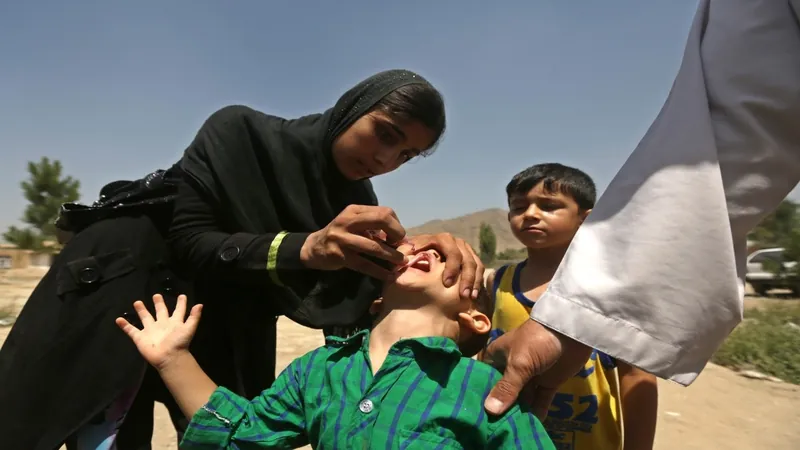
Catastrophic Blow to Public Health: Taliban Halts Polio Vaccination Campaign in Afghanistan
2024-09-29
Overview
The Taliban's recent announcement to suspend the polio vaccination campaign across Afghanistan has sent shockwaves through health communities and concerned parents alike. This stunning decision comes just as the campaign was set to launch, raising alarms about the fate of countless children in one of the world's last remaining polio-endemic regions.
Reasons for Suspension
According to the Taliban, the suspension is temporary and is primarily driven by security concerns, particularly regarding the involvement of women in vaccination efforts. This decision poses a grave threat to public health, especially for children under five, who are most vulnerable to the poliovirus.
Understanding Poliovirus
Poliovirus is notorious for its highly contagious nature, spreading primarily through contaminated hands, food, and water. Early symptoms can mimic other illnesses, including fever and fatigue, but the virus can quickly turn life-threatening. The most severe cases can lead to paralysis, and even death when respiratory muscles are compromised.
Vaccination Efforts Against Polio
The fight against polio took a significant turn with the introduction of two primary vaccines: the live-attenuated oral poliovirus vaccine (OPV) and the inactivated poliovirus vaccine (IPV). Since the launch of the Global Polio Eradication Initiative in 1988, these vaccines have drastically reduced the incidence of polio worldwide. However, Afghanistan and neighboring Pakistan remain stubborn strongholds of the virus.
Impact of the Taliban's Decision
The consequences of the Taliban's suspension are particularly dire in Afghanistan, where, following recent initiatives, health officials had begun employing a house-to-house vaccination strategy for the first time in years. This method, endorsed by the World Health Organization (WHO), has proven far more effective than alternative methods, such as the controversial mosque-to-mosque campaigns implemented in places like Kandahar province, which now harbors a troubling number of unvaccinated children.
Regional Implications
The looming specter of polio extends beyond Afghanistan's borders, threatening the health of children in Pakistan and increasing the risk of outbreak in neighboring regions. As Anwarul Haq, coordinator at the National Emergency Operation Centre for Polio Eradication, noted: “Afghanistan is the only neighbor from where Afghan people in large numbers come to Pakistan and then go back.”
Surging Polio Cases
Tragically, the statistics speak for themselves: paralytic polio cases in Afghanistan have surged from six in 2023 to 14 in just the first few months of 2024. This dramatic increase is indicative of a much broader infection spread, not only in Afghanistan but also in Pakistan, which has reported 13 cases this year. Without adequate vaccination efforts, the number of paralyzed children may rise alarmingly.
Vaccine-Derived Poliovirus Risks
In addition, the risks extend to the possibility of vaccine-derived poliovirus circulating in communities. The weakened virus present in OPV can gain strength in regions with low vaccination rates, potentially leading to new outbreaks. This dangerous dynamic has already prompted outbreaks in parts of Africa and West Asia, as the battle against polio becomes increasingly complicated.
Calls for Action
As experts warn of a potential crisis, the health of countless children hangs in the balance, raising urgent calls for action to restore vaccination initiatives and secure a future free from the devastating consequences of a preventable disease. Will the Taliban reconsider its stance in the face of public outcry and scientific evidence? Only time will tell, but the clock is ticking for the children of Afghanistan.



 Brasil (PT)
Brasil (PT)
 Canada (EN)
Canada (EN)
 Chile (ES)
Chile (ES)
 España (ES)
España (ES)
 France (FR)
France (FR)
 Hong Kong (EN)
Hong Kong (EN)
 Italia (IT)
Italia (IT)
 日本 (JA)
日本 (JA)
 Magyarország (HU)
Magyarország (HU)
 Norge (NO)
Norge (NO)
 Polska (PL)
Polska (PL)
 Schweiz (DE)
Schweiz (DE)
 Singapore (EN)
Singapore (EN)
 Sverige (SV)
Sverige (SV)
 Suomi (FI)
Suomi (FI)
 Türkiye (TR)
Türkiye (TR)